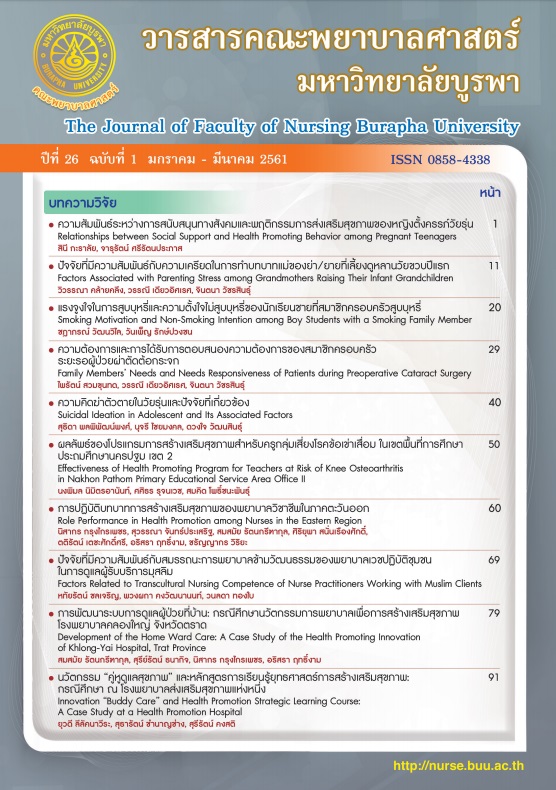Innovation “Buddy Care” and Health Promotion Strategic Learning Course: A Case Study at a Health Promotion Hospital
คำสำคัญ:
: Health promotion, innovation, buddy care, nurses’ rolesบทคัดย่อ
The purposes of this study were to learn from lesson of an innovation “Buddy care”, develop a learning course of health promotion strategies, and outcomes of the course implementation. Informants included staffs of a health promotion hospital, a head of local government, health volunteers, nursing instructors, and registered nurses. Data were carried out by using focus group discussion, in-depth interview, observation, and obtaining its finding to implement and evaluate in a real setting. Research instruments consisted of questions’ guideline for discussion and interview, handbook for learning, a health promotion knowledge test, an evaluation form for health promotion strategic issue studying, and nurse’s roles. Content analysis was used to analyze qualitative data, and quantitative data were analyzed by using descriptive statistics and Wilconxon test.
The results revealed that the innovation “Buddy Care” was developed in 2009 by Tambon Takang’s health promotion hospital, Trat province. There were activities, including leadership development and change management for health promotion, continuing knowledge management, health promotion networks development, and a good role model for Health promotion of health care personnel. Using of the innovation resulted in decreased overweightness among population in the setting, decreased incidence of people newly diagnosed with diabetes mellitus and hypertension patients, and increased known cases of patients being able to control blood sugar level and blood pressure. Outcomes of the Health Promotion Strategic Learning Course found that the learners have more knowledge about health promotion. Learning about roles of nurses for health promotion was at high to highest level, which they could apply for health promotion strategies. These findings suggest that community nurse practitioners and related personnel would obtain the innovation “Buddy Care” together with the learning course of health promotion strategies to utilize in the community health promotion. Consequently, people in the community setting could gain a better health.
เอกสารอ้างอิง
แผนงานเครือข่ายควบคุมโรคไม่ติดต่อ. (2559). รายงานสถานการณ์โรค NCDs ฉบับที่ 2 "Kick off the goals" Retrieved from http://www.dmthai.org/sites/default/files/ncd_nhes_v_2016.pdf
รายงานสถิติการเจ็บป่วยและการตายด้วยโรคไม่ติดต่อเรื้อรัง รพ.สต. ตะกาง. (2552-2554). สถิติโรค. ตราด:
โรงพยาบาลส่งเสริมสุขภาพส่วนตำบลตะกาง.
วิจิตร ศรีสุพรรณ, วิลาวัณย์ เสนารัตน์, & ขนิษฐา นันทบุตร. (2557). นวัตกรรมการสร้างเสริมสุขภาพ ภายใต้บทบาทของวิชาชีพการพยาบาล โครงการขับเคลื่อนวิชาชีพการพยาบาลเพื่อการสร้างเสริมสุขภาพ. ม.ป.ท.
สภาการพยาบาล. (2556). โครงการขับเคลื่อนวิชาชีพพยาบาล เพื่อการสร้างเสริมสุขภาพ. นนทบุรี: สภาการพยาบาล. (เอกสารอัดสำเนา)
สิทธิพล อาจอินทร์. (2557). การพัฒนาหลักสูตร (Curriculum Development). ขอนแก่น: มหาวิทยาลัยขอนแก่น.
สุรเกียรติ อาชานานุภาพ. (2550). การสร้างสาธารณสุขมูลฐานและการสร้างเสริมสุขภาพ:จากสากลสู่ไทย. ใน
อำพล จินดาวัฒนะและคณะ (บรรณาธิการ), การสร้างเสริมสุขภาพ : แนวคิด หลักการ และบทเรียนของไทย. กรุงเทพฯ: สำนักพิมพ์หมอชาวบ้าน.
Long, J. A. (2012). "Buddy System" of peer mentors may help control diabetes. Leonard Davis
Institute of Health Economics, 17(6), Isssue Brief.
MacPherson, S. L., Joseph, D., & Sullivan, E. (2004). The benefits of peer support with diabetes.
Nursing Forum, 39(4), 5-11.
Karen Glanz, K., Rimer, B. K. & Lewis, F. M. (Eds.). (2002). Health behavior and health education:
Theory, research, and practice. (3rd ed.). San Fcisco: Jossey-Bass.
Saylor, J. G., Alexander, W. M., & Lewis, A. J. (1981). Curriculum planning for better teaching and
learning (4th ed.). New York, NY: Holt, Rinehart, & Winston. Taba, H. (1962). Curriculum development: Theory and practice. New York: Harcourt Brace
Jovanovich.
World Health Organization [WHO]. (1986). Health Promotion. Retrieved 22 March,
2015 From: http://www.who.int/healthpromotion/conferences/
previous/ottawa/en/index1.html
World Health Organization [WHO]. (2014). Global status report on non-communicable disease
2014. Geneva: World Health Organization.





